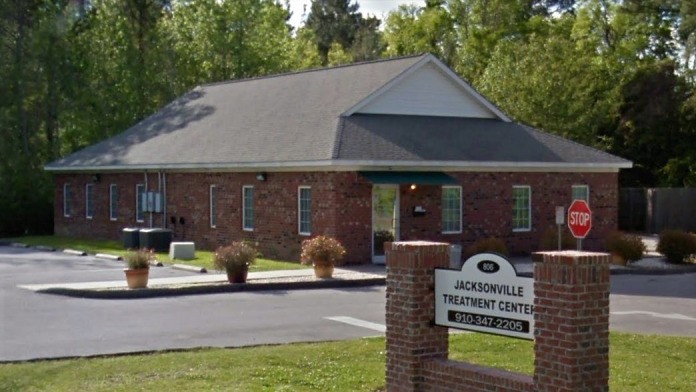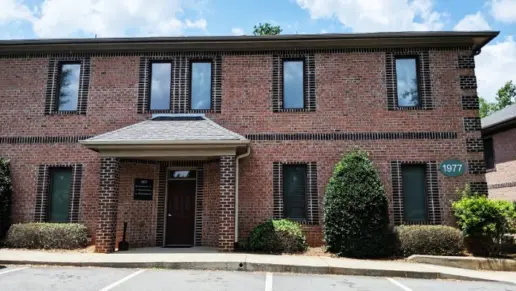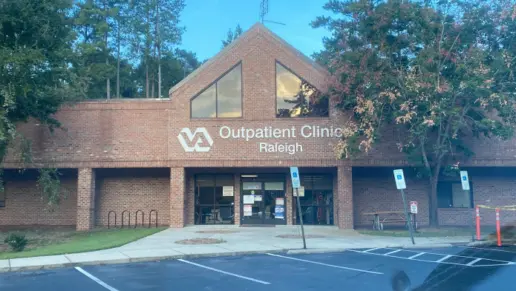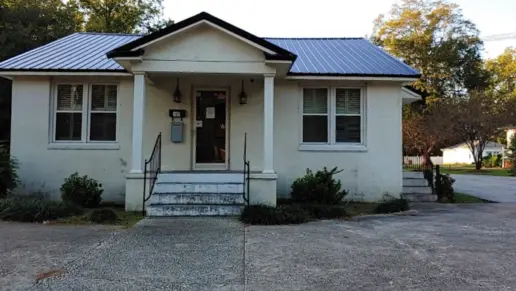My fiance has been coming here for 3 years and we do nothing but fight the staff on her treatment week buy week. I have to threaten to get my lawyer involved to get them to allow her to start an administrative dose down. Terrible place. The staff is all a bunch of rude snobs ...
About Jacksonville Treatment Center
Located in Jacksonville, North Carolina, the Jacksonville Treatment Center offers a holistic treatment modality for opioid use disorder, other substance abuse disorders and co-occurring mental health issues. Jacksonville Treatment Center accepts multiple insurances, including Medicaid, making it accessible to more people.
Their standout service is medication assisted treatment (MAT) combining methadone, buprenorphine and Suboxone with counseling. This dual approach helps lessen withdrawal symptoms and cravings, creating a platform for patients to tackle their road to recovery. MAT plays an important role in maintaining long-term recovery and it reduces the chances of relapse, which is integral to matters that involve opioid addiction.
Their substance abuse treatment program is extensive and focused on anyone struggling with any substance. The program offers one on one counseling as well as group therapy and education addressing coping skills, cravings and triggers. Their holistic method gets rid of the drugs and not only helps individuals break free from their physical dependency but also gives them tools to maintain sobriety and improve their quality of life.
The mental health services at the Jacksonville Treatment Center also treat co-occurring disorders, which means they not only treat addiction but any co-occurring mood or anxiety disorder such as depression or an alcohol use disorder. Such an integrated approach makes sure that the patients get full treatment which focuses on both the psychological and physical nature of addiction.
The center also offers outpatient resources for individuals needing more flexibility. Outpatient programs work well for those whose job or family commitments make treatment difficult but who still need help. Patients can continue their everyday lives and come for therapy, medical evaluations and other support services.
Latest Reviews
Rehab Score
Gallery

Location
Other Forms of Payment
Self-pay involves paying for treatment out of your own pocket. You can use savings or credit, get a personal loan, or receive help from family and friends to fund your treatment. If you don't have insurance or your insurance plan doesn't cover a specific program, self-pay can help ensure you still get the care you need.
Medicaid is a state based program that helps lower-income individuals and families pay for healthcare. Medicaid covers addiction treatment so those enrolled can use their coverage to pay for rehab. When a program accepts Medicaid the client often pays very little or nothing out of their own pocket.
Addiction Treatments
Levels of Care
Treatments
The goal of treatment for alcoholism is abstinence. Those with poor social support, poor motivation, or psychiatric disorders tend to relapse within a few years of treatment. For these people, success is measured by longer periods of abstinence, reduced use of alcohol, better health, and improved social functioning. Recovery and Maintenance are usually based on 12 step programs and AA meetings.
There are many types of drug rehab in North Carolina. To receive treatment for addiction, you can choose from many inpatient and outpatient programs. Often, participants start with detox and work through a full continuum of care that continues with ongoing support for long-term recovery.
Opioid rehabs specialize in supporting those recovering from opioid addiction. They treat those suffering from addiction to illegal opioids like heroin, as well as prescription drugs like oxycodone. These centers typically combine both physical as well as mental and emotional support to help stop addiction. Physical support often includes medical detox and subsequent medical support (including medication), and mental support includes in-depth therapy to address the underlying causes of addiction.
Substance rehabs focus on helping individuals recover from substance abuse, including alcohol and drug addiction (both illegal and prescription drugs). They often include the opportunity to engage in both individual as well as group therapy.
Programs


Clinical Services
Clients who receive cognitive behavioral therapy in North Carolina typically attend five to 20 sessions. During this time, they work with their therapist to learn healthier patterns of thinking, which can help them change their behavior related to substance use.
Whether a marriage or other committed relationship, an intimate partnership is one of the most important aspects of a person's life. Drug and alcohol addiction affects both members of a couple in deep and meaningful ways, as does rehab and recovery. Couples therapy and other couples-focused treatment programs are significant parts of exploring triggers of addiction, as well as learning how to build healthy patterns to support ongoing sobriety.
Research clearly demonstrates that recovery is far more successful and sustainable when loved ones like family members participate in rehab and substance abuse treatment. Genetic factors may be at play when it comes to drug and alcohol addiction, as well as mental health issues. Family dynamics often play a critical role in addiction triggers, and if properly educated, family members can be a strong source of support when it comes to rehabilitation.
Group therapy is any therapeutic work that happens in a group (not one-on-one). There are a number of different group therapy modalities, including support groups, experiential therapy, psycho-education, and more. Group therapy involves treatment as well as processing interaction between group members.
In individual therapy, a patient meets one-on-one with a trained psychologist or counselor. Therapy is a pivotal part of effective substance abuse treatment, as it often covers root causes of addiction, including challenges faced by the patient in their social, family, and work/school life.
If you're struggling with insecurity about your ability to make changes in your life, motivational interviewing in North Carolina could be a good solution. This type of therapy offers support and empowerment to help you explore your options and decide how to move forward with positive changes.
Counseling that applies dialectical behavior therapy teaches you coping skills to apply to your daily life. The focus is on intense emotions and developing coping mechanisms to manage them. Therapy sessions are a series of teaching lessons that help you develop these coping skills.
Accreditations

The Commission on Accreditation of Rehabilitation Facilities (CARF) is a non-profit organization that specifically accredits rehab organizations. Founded in 1966, CARF's, mission is to help service providers like rehab facilities maintain high standards of care.
CARF Accreditation: Yes
Accreditation Number: 212037

The Substance Abuse and Mental Health Services Administration (SAMHSA) is a branch of the U.S. Department of Health and Human Services. Established in 1992 by congress, SAMHSA's mission is to reduce the impact of substance abuse and mental illness on American's communities.
SAMHSA Listed: Yes
Contact Information
806 Bell Fork Road
Jacksonville NC, 28540


